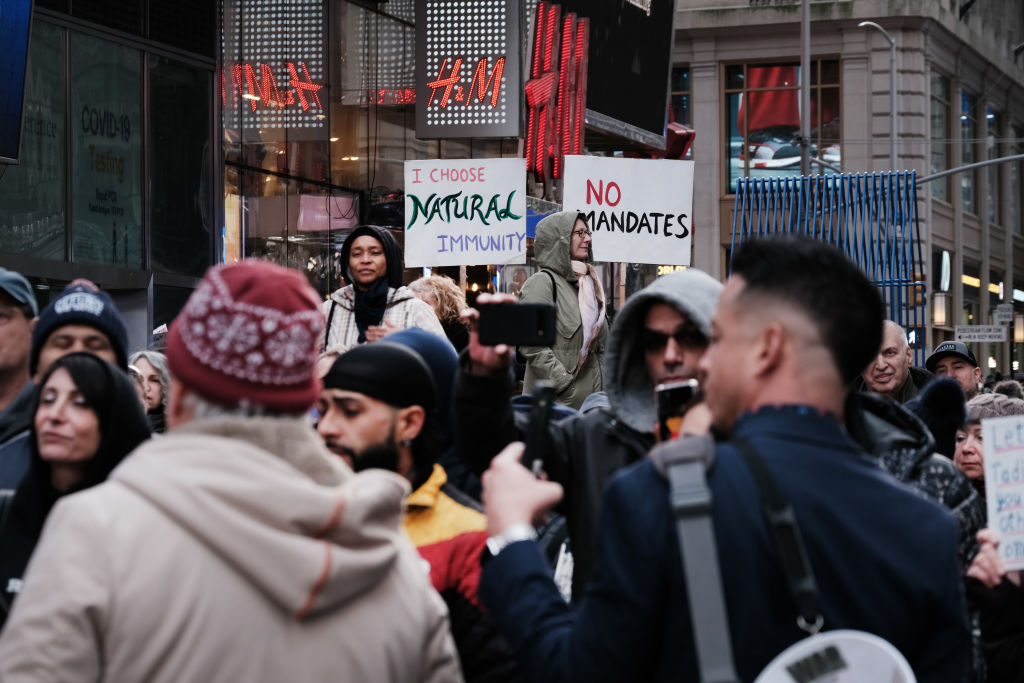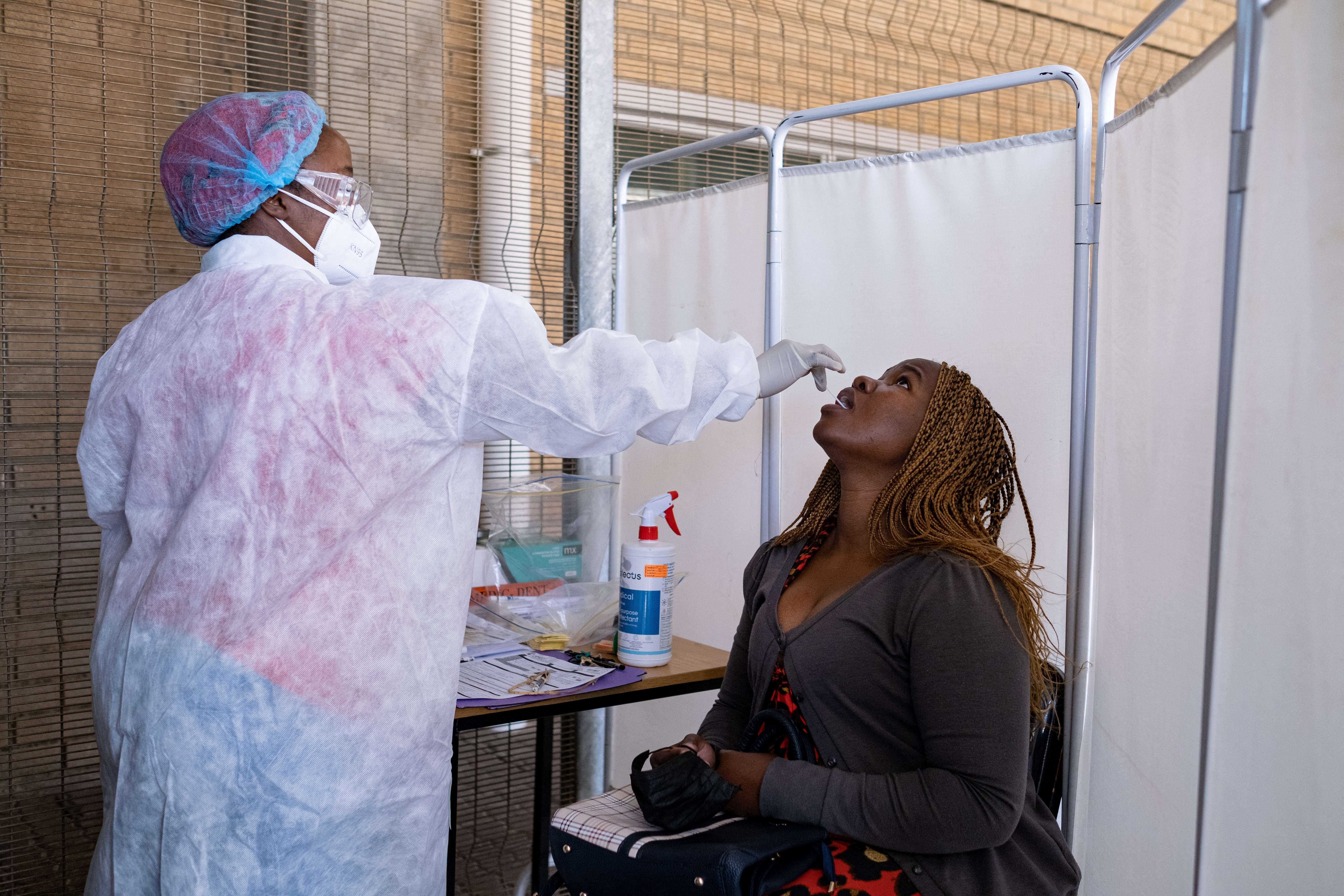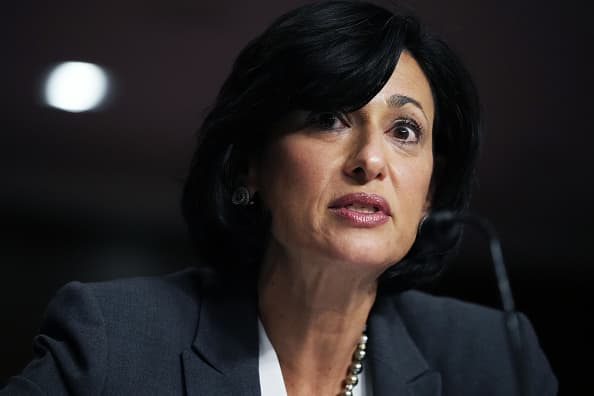What to Know
- Starting Dec. 27, NYC's vaccine mandate will expand to all private-sector workers, a move Mayor Bill de Blasio called the first of its kind in the nation as he announced the looming changes on Monday
- The mandate is tightening in other ways, too: proof of two doses rather than one will be required, and kids aged 5 to 11, will have to show proof of one for indoor dining and other activities starting on Dec. 14
- The latest development comes as the number of confirmed omicron cases rises across the city and the nation, along with the daily COVID-19 positivity rate; early evidence on its severity, though, is encouraging
All private-sector workers in New York City will be subject to the mayor's vaccine mandate starting Dec. 27, affecting 184,000 businesses, while vaccine proof for indoor dining, fitness and entertainment will be required for children ages 5 to 11, according to a toughened vaccine mandate announced by Bill de Blasio Monday.
The current rule will also expand to require two vaccine doses instead of proof of only one as far as people age 12 and older are concerned, the mayor said. That excludes people who were vaccinated with Johnson & Johnson's single-dose shot.
Kids aged 5 to 11 only need to show proof of one dose when the requirement for them kicks in on Dec. 14, considering they only first became eligible for their initial doses in early November and must wait at least 21 days between Pfizer's doses.
Get Tri-state area news delivered to your inbox. Sign up for NBC New York's News Headlines newsletter.
De Blasio hinted late last week that changes to the city's vaccine policies could be coming soon, given the latest challenges posed in the city's ongoing COVID war. He says more measures may be imminent as far as vaccinations go, too.
"We’ve got omicron as a new factor. We’ve got the colder weather which is going to really create additional challenges with the delta variant, we’ve got holiday gatherings," de Blasio said Monday as he announced the mandate on MSNBC. "We in New York City have decided to use a preemptive strike to really do something bold to stop the further growth of COVID and the dangers it’s causing to all of us."
He said the city will issue additional enforcement and reasonable accommodation guidance to support small businesses with implementation on Dec. 15, about a week and a half before the mandate takes effect. Asked about potential consequences, de Blasio says some have to be in play. He didn't elaborate but he said few businesses have had to be penalized to date because of the rules.
For the city's workforce, noncompliance with the vaccine mandate in the absence of an approved exemption comes with unpaid leave. Some smaller private businesses may not have that capacity, de Blasio acknowledged, which is why he says his administration is taking the next nine days to work out details with them.
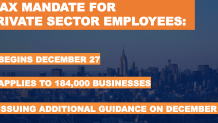
The mayor was also asked about his legal authority to implement such an all-encompassing vaccine mandate, especially given President Joe Biden's mandate for private employers with workforces of 100 or more employees has stalled in the courts. De Blasio said there is a "legal right of the health commissioner to keep the people of this city safe. That is something that's been proven time and time again."
"When the health commissioner believes there is a pressing public health threat, he has the ability to act in that situation," the mayor said of the "broad strokes."
His corporation counselor, Georgia Pestana, affirmed the legal authority of the city's health commissioner to implement such sweeping rules and said city and state courts have continuously upheld that concept amid a number of challenges these last few months.
Pestana said the issue the Biden administration faces "doesn't really apply here" because the injunctions were issued over the legal authority of the Occupational Safety and Health Administration (OSHA) to manage mandate implementation in one case and Centers for Medicare & Medicaid Services in another.
"Here, I don't believe there is any question that Dr. [Dave] Chokshi has the authority to issue this mandate and it's the across-the-board nature of it that I think also makes it defensible," Pestana said.
The head of the Partnership for New York, which builds relationships between city businesses and the government, didn't feel that way — at least from a political sense. Kathy Wylde said businesses were blindsided by the mayor's announcement and accused him of potentially hurting businesses that already have high employee vaccination rates independent of any mandate. Wylde slammed the mayor especially for the lack of guidance associated with Monday's announcement, a hit de Blasio absorbed earlier in the day as he pledged extensive guidelines to come.
Though not popular with all employers or all employees, the mayor insists evidence shows that vaccine mandates work.
Ninety-four percent of the city's 387,000-member workforce is now vaccinated, up from 84% the day before the second expansion — the one mandating vaccinations for all city workers except those who work in correction took effect — according to the mayor's office. Mandates for school and health staff were in place before that.
All of these changes, of course, could be reversed should Mayor-Elect Eric Adams opt not to continue them when he takes office on Jan. 1. The Dec. 27 mandate start date is just four days before that. De Blasio said he has updated Adams on the plans and Adams has said he understands there are "urgent threats facing our city and it's the mayor's job to protect New Yorkers" but said he'd let the mayor-elect speak for himself. Adams has been in Ghana but is due to return on Wednesday.
A spokesman for Adams did release a brief yet noncommittal statement Monday as far as the mandate goes, saying, "The Mayor-elect will evaluate this mandate and other COVID strategies when he is in office and make determinations based on science, efficacy and the advice of health professionals."
The NYC Hospitality Alliance, which represents the city's restaurant industry, said in its own statement that any mandate changes should be delayed until Adams is in office. It has particular concerns about the ramifications of adding requirements for kids, especially with the holiday season upon us and tourism rebounding.
"Public health and safety is paramount, but Mayor de Blasio’s announced expansions to the Key to NYC vaccine mandate pose additional challenges for an already beleaguered restaurant industry in need of tourism support and revenues this holiday season," NYC Hospitality Alliance Executive Director Andrew Rigie said. "U.S. families visiting New York City for scheduled holiday vacations may not be able to meet the vaccination requirements for children or themselves in time, and children aged 5-11 across the globe aren’t universally authorized to get vaccinated."
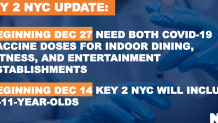
As it stands now, New York City's vaccine mandate requires proof of just one dose for the municipal workforce and a number of other higher-risk sectors and the same to enter restaurants, bars, gyms and other venues. The latter has not applied to the youngest eligible for vaccination, those aged 5 to 11, but it will going forward, though children in that age group will only have to show proof of one dose for now.
That proof for those younger kids will also be required for high-risk extracurricular activities like sports, band, orchestra and dance starting in just eight days, while the two-dose requirement for people age 12 and up takes effect on Dec. 27.
"Our youngest kids, we got to reach them now. Right now in this city, it's about 20% have gotten to that stage in that 5 to 11 range. The vaccine is relatively new," the mayor said. "But what we're trying to say to parents is it's urgent. Before omicron grows, before delta continues to stress us even worse in the winter months, get your kid vaccinated. And here's an incentive to do it."
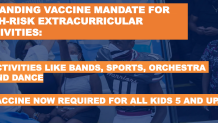
At this point, it does not mandate proof of a booster dose as well, which about 15% of vaccinated adults have received, but de Blasio has suggested that booster addition could also be on the table at some point should the situation warrant.
Officials had hoped that those who got their first vaccine dose would most certainly complete their series, but the latest data shows that isn't always the case. Nearly 82% of New York City adults are fully vaccinated, but more than 89% report having received at least one shot.
Both numbers drop dramatically when it comes to kids ages 5 to 17, 35.7% of whom are fully vaccinated. About 47% have at least one dose, though many kids in the 5-to-11 group who just got their first doses likely have second ones planned in the near future.
The latest development comes as the number of confirmed omicron cases rises across the city and the nation, along with the daily COVID-19 positivity rate.
The five boroughs' rolling weekly case average is up 31% over the seven-day averages for the prior four weeks, though that alone stokes far less concern than any trending uptick, significant or otherwise, in severe cases, officials have said.
Hospitalizations have been rising in the city but incrementally — and experts believe that has been fueled by the still-omnipresent delta variant, which evidence shows is linked to more severe illness. De Blasio said Monday the city's current rolling hospitalization rate per 100,000 residents had topped 1.0 (barely) for the first time in a number of months. Daily deaths are stable or declining, per the latest data.
The mayor's team says the stricter approach outlined Monday is intended to combat the unknowns of omicron, the ongoing, known threat from delta and the anticipated threat of holiday travel and gatherings that manifested last year.
More Coverage
While the emergence of the omicron variant has flooded headlines for the last two weeks, the still-omnipresent delta strain is the one driving up hospitalizations across the United States, health officials say. The greatest risk omicron poses is to the unvaccinated, who keep spreading the virus, an ex-White House advisor says.
Three new cases of the omicron variant in New York City were announced over the weekend, bringing the number of cases in the Big Apple to seven on top of the previously confirmed case out on Long Island. Across the tri-state, there are at least 10 confirmed cases with one in New Jersey and another in Connecticut.
The good news is there doesn't appear to be a significantly higher threat of severe illness linked to the newly detected coronavirus strain right now, but there's still much to learn about omicron.
Reports from South Africa, where it first emerged and is becoming the dominant strain, suggest that hospitalization rates have not increased alarmingly.
“Thus far, it does not look like there’s a great degree of severity to it,” President Joe Biden's chief medical adviser, Dr. Anthony Fauci, told CNN on Sunday. “But we have really got to be careful before we make any determinations that it is less severe or it really doesn’t cause any severe illness, comparable to delta.”
Still, concerns about omicron triggered a new requirement starting Monday for international travelers coming into the U.S. to show a negative COVID test taken 24 hours prior to their departure, regardless of their vaccination status.
Omicron had been detected in at least a third of U.S. states by Monday, including in the South, the Great Plains and the West Coast. Mississippi, Wisconsin, Missouri and Louisiana were among the latest states to confirm cases. New York Gov. Kathy Hochul said in a Monday evening tweet that four more cases had been identified in the state.
"With a new variant circulating in New York, the best way to stay safe this holiday season is by getting vaccinated and boosted," Hochul said Sunday. "With holiday gatherings just weeks away, you can protect yourself and your loved ones by getting vaccinated and encouraging everyone in your life to do the same."
De Blasio said Monday he had spoken with Hochul ahead of his vaccine mandate update but neither he nor she has provided any indication as to whether she would follow suit at the state level. Given how the situation has played out so far, and the varying factors at play across the state vs. New York City, it seems unlikely.
The two Democrats jointly announced the first confirmed cases of the newest variant last week, hours after news broke that a vaccinated Minnesota man who attended the two-day Anime NYC convention at the Javits Center a few weeks ago got COVID and testing showed it was omicron.
Health officials are still working to learn more about the first five cases, but they include a 67-year-old woman on Long Island who had recently traveled to South Africa, residents of Brooklyn and Queens and another New York City case possibly linked to travel. At least one person had received a dose of a COVID-19 vaccine but officials did not have details about the vaccination statuses of the four other cases.
The one confirmed case in Connecticut also appeared to be connected to the anime convention, according to Gov. Ned Lamont. That person was also vaccinated.
Even if omicron proves less dangerous than delta, it remains problematic, World Health Organization epidemiologist Dr. Maria Van Kerkhove recently told CBS' “Face The Nation.”
“Even if we have a large number of cases that are mild, some of those individuals will need hospitalizations,” she said. “They will need to go into ICU and some people will die. ... We don’t want to see that happen on top of an already difficult situation with delta circulating globally.”
Two years into the outbreak, COVID-19 has killed over 780,000 Americans, and deaths are running at about 860 per day.
More than 6,600 new hospital admissions are being reported daily, according to tracking data from the U.S. Centers for Disease Control and Prevention.
COVID-19 cases and deaths in the U.S. have dropped by about half since the delta peak in August and September, but at more than 86,000 new infections per day, the numbers are still high, especially heading into the higher-risk holiday season.

